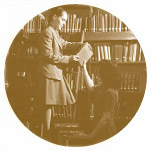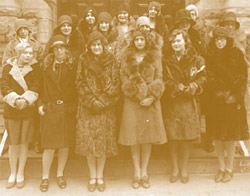The Century Club (Page 4)
100 Years of Library Studies

Nicolas Morin
If Charles Gould, Chief Librarian at McGill and founder of the McGill School of Library Sciences, were to survey the professional terrain today, he would recognize only a few landmarks. He would still find books and papers, certainly, but also electronic data, celluloid images, online documents - the world of library and information science professionals has changed dramatically. In 1897, the McGill library system had 70,000 books but little staff - and there was no library school anywhere in Canada.
To address the problem, Gould began an internship program at the Redpath Library, providing library training to unpaid volunteers and giving them professional skills in exchange for labour. In 1904, the success of this strategy prompted him to establish the first of a series of intensive annual summer schools that was to become the School of Library Science. The School was at the forefront of library studies; in its first year, courses were taught by Gould's friend Melvyl Dewey, of "decimal system" fame. These courses, interrupted only by World War I, formed the first academically based library program in Canada, offering diplomas to graduates.
In 1930, Gerhard Lomer, who followed Gould as the University's Librarian, established a Bachelor of Library Science (BLS) program which required that entering students arrive with a bachelor's degree in another subject - a hefty qualification in those days. Lomer also took the McGill brand of library training around the country, operating Vancouver, Banff and Prince Edward Island summer schools.
In 1965, the program received a major overhaul, replacing the BLS with a two-year Master of Library Science (MLS) program - an innovative approach that quickly became accepted as the Canadian norm, and has been imitated in the U.S. and around the world. This structural change necessitated a new name - the Graduate School of Library Science - and, a year later, a move from the old digs in the Redpath Library to a temporary home on Dr. Penfield Avenue and, in 1969, to the ground floor of the new McLennan Library. In 1985, the program again changed its name, to the Graduate School of Library and Information Studies, and today stands as the oldest continuously accredited program in North America.

Reshelving books in the Redpath Library in 1945.
So the GSLIS had plenty to celebrate at its official centenary bash on May 15. Dr. Joanne Gard Marshall, MLS'68, Dean of the School of Information and Library Science at the University of North Carolina, presented a keynote speech, followed by a discussion with Professor Peter McNally, Director of the History of McGill Project, Lise Bissonnette, CEO of the Bibliothèque nationale du Québec, and Dr. Anthony Masi, Deputy Provost and Chief Information Officer of McGill.
More than a hundred former faculty members and alumni, including guest of honour Fatima Houda-Pepin, MLS'81, member of the Quebec National Assembly, attended the celebrations and, to create an enduring impression, the GSLIS established a Centenary Scholarship fund, setting a target of $100,000. The scholarship is timely: as the GSLIS hits the century mark, it is also experiencing a growth spurt, with a record enrolment of 17 doctoral and about 160 master's students. More are anticipated with the growing need to manage information.
Indeed, while books can last a long time, the world of library and information studies continues to change, and quite rapidly. "For the last couple of years, we've been introducing new concentrations, or tracks of study," says Jamshid Beheshti, the School's outgoing director. The tracks include traditional library and information studies, along with knowledge management, archival studies and information literacy studies.
"We've hired Kimiz Dalkir for knowledge management, and he has introduced four new courses," says Beheshti. Archival studies, including such things as digital archives, also form a hot topic: "How would one sift through and archive all the digital information being created?" he asks. Information literacy or competency studies explores, among other things, the idea of training librarians to teach information literacy skills to students and the general public, as such skills become increasingly necessary to take advantage of the huge amounts of information - much of it spurious - available today.

The graduating Library Science class of 1929-30 in front of Redpath Hall.
And, as Beheshti notes, there is plenty of demand for these skills beyond the university. "Outside interest is one of the driving forces in creating these concentrations. We receive many calls regarding archival and knowledge management."
The fundamental goals of library and information studies have remained the same over the years, but vast new sources and forms of information mean that the GSLIS must be ever adaptable - and in this quality, the legacy of Gould, Lomer and the other pioneers of library studies at McGill is being fully realized.
For more information about the Graduate School of Library and Information Studies, see www.gslis.mcgill.ca.


